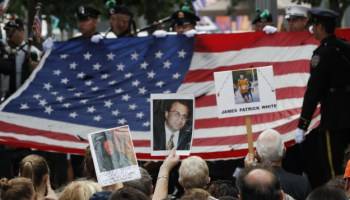WASHINGTON - The US Congress voted overwhelmingly Wednesday to override Barack Obama’s veto of a bill allowing 9/11 victims to sue Saudi Arabia, the first such rebuke of his eight-year presidency.
The Senate overrode the veto in a 97-1 vote, followed a short time later by the House of Representatives, which knocked it down with a 348-77 vote.
The rare act of bipartisanship was a blow to Obama, who lobbied hard against the bill, known as the Justice Against Sponsors of Terrorism Act (JASTA).
White House press secretary Josh Earnest called the Senate vote “the single most embarrassing thing” the legislative body has done in decades.
“Ultimately these senators are going to have to answer their own conscience and their constituents as they account for their actions today,” he told reporters travelling with Obama in Richmond, Virginia.
Coming in Obama’s last months in office, the vote shows the White House to be much weakened.
Obama has issued 12 vetoes during his presidency. None have been overridden until now, a rare feat given Republicans’ longstanding control of Congress.
His Republican predecessor George W Bush also issued 12 vetoes, of which four were overridden. The last president to avoid an override was the legendary Democratic congressional dealmaker - and former senator and congressman - Lyndon Johnson.
The White House argued the 9/11 bill would undermine the principle of sovereign immunity, opening up the United States to lawsuits.
In a letter to Republican and Democratic Senate leaders obtained by AFP, Obama said: “I strongly believe that enacting JASTA into law would be detrimental to US national interests.”
Obama warned of “devastating” consequences for the Pentagon, service members, diplomats and the intelligence services. It would “neither protect Americans from terrorist attacks, nor improve the effectiveness of our response to such attacks,” he warned.
“The United States relies on principles of immunity to prevent foreign litigants and foreign courts from second-guessing our counterterrorism operations and other actions that we take every day.”
Families of 9/11 victims have campaigned for the law, convinced the Saudi government had a hand in the attacks that killed almost 3,000 people.
Fifteen of the 19 hijackers were Saudi citizens, but no link to the government has been proven. The Saudi government denies any ties to the plotters.
Declassified documents showed US intelligence had multiple suspicions about links between the Saudi government and the attackers.
“While in the United States, some of the 9/11 hijackers were in contact with, and received support or assistance from, individuals who may be connected to the Saudi government,” a finding read.
“Overriding a presidential veto is something we don’t take lightly, but it was important in this case that the families of the victims of 9/11 be allowed to pursue justice, even if that pursuit causes some diplomatic discomforts,” Senator Charles Schumer, the third-ranking Democrat in the Senate, said in a statement.
Schumer represents New York, the site of the World Trade Center and home to many of the nearly 3,000 people killed in the 2001 attacks, attack survivors and families of victims.
He led the fight for the legislation in the Senate, with Senator John Cornyn, the No 2 Senate Republican. Kirsten Gillibrand, New York’s other senator and also a Democrat, cast the 67th “no” vote, the number needed to override the veto in the Senate.
Obama had argued that the bill, known as JASTA, could expose US companies, troops and officials to lawsuits, and alienate important allies at a time of global unrest. He called Senate Minority Leader Harry Reid and wrote a personal letter to him explaining that he strongly believed enacting JASTA into law would be detrimental to US interests. Reid became the only senator to side with Obama.
The Saudi government financed an extensive lobbying campaign against the legislation. Major US corporations including General Electric Co and Dow Chemical Co also opposed it, as did the European Union and other US allies.
Secretary of Defence Ash Carter urged lawmakers to sustain the veto, and in an unusual move, CIA Director John Brennan issued a statement before Wednesday’s votes saying the bill had “grave implications” for national security.
Democratic Senator Tim Kaine, Hillary Clinton’s vice presidential running mate, and Bernie Sanders, an independent and former Democratic White House contender, did not vote.
A senior Saudi prince reportedly threatened to pull billions of dollars out of US assets if it becomes law, but Saudi officials now distance themselves from that claim.
The US-Saudi relationship had already been strained by Obama’s engagement with Saudi’s Shia foe Iran and the July release of a secret report on Saudi involvement in the 9/11 attacks.






